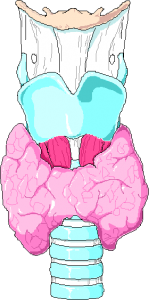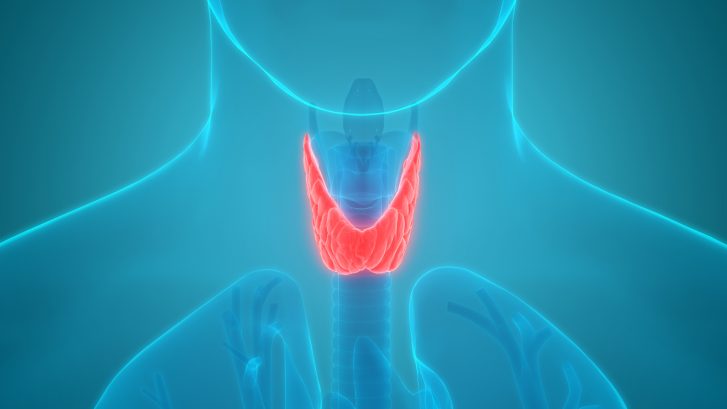Thyroid Function Explained
Did you know that an estimated 20 million Americans have a thyroid condition? Moreover, statistics show that 60 percent of people with thyroid conditions don’t know that they have a condition at all (1).
The thyroid gland is a bowtie shaped gland near the center of your neck. Diseases impacting the thyroid gland can often cause enlargement of this tissue, and /or nodule formation. The Doctors at Natural Medicine Center (NMC) have functional imaging techniques to confirm tissue changes.
While it is an oversimplification, the following analogy is instructive: Please think of circulating thyroid hormone particles as “fuel injectors” for boosting your metabolism. This fuel fosters our metabolic reactions, so fuel creates energy. It is through thyroid hormones [T3 and T4] that you are able to regulate body temperature. Moreover, the relative abundance of T3 hormones will dictate fat-burning actions and protein utilization patterns throughout your body. All of our NMC Doctors want readers to be aware of two prevalent thyroid conditions–hypothyroidism and hyperthyroidism. Less common thyroid conditions include thyroid cancer, thyroid nodule accumulation disorders and nonspecific goiters.

Hypothyroidism is the most common thyroid condition, and this instigates (i) weight gain, (ii) tiredness, (iii) hair loss, and (iv) cold extremities. A very common variant of Hypothyroidism is Hashimoto’s Disease. As the prefix for hypothyroidism implies, thyroid glandular tissue fails to excrete enough T3 and T4 hormones. If left untreated more severe problems can occur including heart and nerve problems.
Hyperthyroidism is a condition in which the thyroid excretes too much thyroid hormone. A very common variant of hyperthyroidism is Graves Disease. This presents with symptoms such as (i) irritability, (ii) weight loss, (iii) heart palpitations, and (iv) diarrhea. If the hyperthyroid condition is left untreated, the neglected hyperthyroid patients may suffer damages to their heart, bones, muscles and reproductive organs.
A recent trend picked up by Doctors at NMC is to observe *mutual* thyroiditis defects–meaning the patient displays both Hashimoto’s and Graves Disease. When Hashimoto’s co-occurs with Graves, the patient’s thyroid goes through stages of excreting too much thyroid hormone and then skips to secreting too little. It is important to note that thyroiditis can be triggered by food or environmental allergies. This is why Doctors at NMC are routinely checking for Hashimoto’s and for Graves diseases. It is very valuable to know which autoimmune thyroiditis is being manifest, because a clinically directed lifestyle change can re-stabilize the thyroid [e.g., patients who test positive for Hashimoto’s should avoid gluten, cut out dairy and eat low glycemic foods. Patients with Graves disease can promote stable thyroid function by avoiding caffeine and ionized salt.
Normally, thyroid blood tests are done annually during a wellness visit with a general practitioner. However, if you have a thyroid condition or have symptoms of a thyroid condition, getting a complete thyroid panel is the best way to understand how and why your thyroid isn’t functioning correctly.
At a general practitioners visit, they often only check the TSH (thyroid stimulating hormone). At The Natural Medicine Center we like to take it several steps further. The reason is, that dysfunction often occurs even when the TSH is ‘in normal clinical ranges’. We test T3 Total, T3 Free, T4 Total, T4 Free, TSH, Thyroglobulin, Reverse T3 and thyroid peroxidase. With these additional tests, we will know 3 very important things that we wouldn’t know if we only ran a TSH blood test.
These 3 things include:
- autoimmune involvement
- if high stress is corrupting the dissemination of active T hormones to body tissues
- if liver/ kidney function is preventing the distribution and uptake of T hormones by cells or tissues
Once the blood test results are in, our doctors can recommend naturally compounded RX medications, Chinese herb remedies, and lifestyle practices to support thyroid function.
Ways to support thyroid function right away:
- Avoid Red dye #3
- Educate yourself on yersinia in pork
- Avoid gluten and dairy
- Eat foods naturally rich in iodine
Want more information? Call us at 863-899-9977 or book an appointment https://booknow.appointment-plus.com/12pzdqmq/
Source:
- thyroid.org

